- Home
- George Orwell
The Complete Novels Page 24
The Complete Novels Read online
Page 24
U Po Kyin had even sent one of his anonymous letters to Mrs Lackersteen, for he knew the power of European women. Dr Veraswami, the letter said, was inciting the natives to abduct and rape the European women–no details were given, nor were they needed. U Po Kyin had touched Mrs Lackersteen’s weak spot. To her mind the words ‘sedition’, ‘Nationalism,’, ‘rebellion’, ‘Home Rule’, conveyed one thing and one only, and that was a picture of herself being raped by a procession of jet-black coolies with rolling white eyeballs. It was a thought that kept her awake at night sometimes. Whatever good regard the Europeans might once have had for the doctor was crumbling rapidly.
‘So you see,’ said U Po Kyin with a pleased air, ‘you see how I have undermined him. He is like a tree sawn through at the base. One tap and down he comes. In three weeks or less I shall deliver that tap.’
‘How?’
‘I am just coming to that. I think it is time for you to hear about it. You have no sense in these matters, but you know how to hold your tongue. You have heard talk of this rebellion that is brewing near Thongwa village?’
‘Yes. They are very foolish, those villagers. What can they do with their dahs and spears against the Indian soldiers? They will be shot down like wild animals.’
‘Of course. If there is any fighting it will be a massacre. But they are only a pack of superstitious peasants. They have put their faith in these absurd bullet-proof jackets that are being distributed to them. I despise such ignorance.’
‘Poor men! Why do you not stop them, Ko Po Kyin? There is no need to arrest anybody. You have only to go to the village and tell them that you know their plans, and they will never dare to go on.’
‘Ah well, I could stop them if I chose, of course. But then I do not choose. I have my reasons. You see, Kin Kin–you will please keep silent about this–this is, so to speak, my own rebellion. I arranged it myself.’
‘What!’
Ma Kin dropped her cigar. Her eyes had opened so wide that the pale blue white showed all round the pupil. She was horrified. She burst out:
‘Ko Po Kyin, what are you saying? You do not mean it! You, raising a rebellion–it cannot be true!’
‘Certainly it is true. And a very good job we are making of it. That magician whom I brought from Rangoon is a clever fellow. He has toured all over India as a circus conjurer. The bullet-proof jackets were bought at Whiteaway & Laidlaw’s stores, one rupee eight annas each. They are costing me a pretty penny, I can tell you.’
‘But, Ko Po Kyin! A rebellion! The terrible fighting and shooting, and all the poor men who will be killed! Surely you have not gone mad? Are you not afraid of being shot yourself?’
U Po Kyin halted in his stride. He was astonished. ‘Good gracious, woman, what idea have you got hold of now? You do not suppose that I am rebelling against the Government? I–a Government servant of thirty years’ standing! Good heavens, no! I said that I had started the rebellion, not that I was taking part in it. It is these fools of villagers who are going to risk their skins, not I. No one dreams that I have anything to do with it, or ever will, except Ba Sein and one or two others.’
‘But you said it was you who were persuading them to rebel?’
‘Of course. I have accused Veraswami of raising a rebellion against the Government. Well, I must have a rebellion to show, must I not?’
‘Ah, I see. And when the rebellion breaks out, you are going to say that Dr Veraswami is to blame for it. Is that it?’
‘How slow you are! I should have thought even a fool would have seen that I am raising the rebellion merely in order to crush it. I am–what is that expression Mr Macgregor uses? Agent provocateur–Latin, you would not understand. I am agent provocateur. First I persuade these fools at Thongwa to rebel, and then I arrest them as rebels. At the very moment when it is due to start, I shall pounce on the ringleaders and clap every one of them in jail. After that, I dare say there may possibly be some fighting. A few men may be killed and a few more sent to the Andamans. But, meanwhile, I shall be first in the field. U Po Kyin, the man who quelled a most dangerous rising in the nick of time! I shall be the hero of the district.’
U Po Kyin, justly proud of his plan, began to pace up and down the room again with his hands behind his back, smiling. Ma Kin considered the plan in silence for some time. Finally she said:
‘I still do not see why you are doing this, Ko Po Kyin. Where is it all leading? And what has it got to do with Dr Veraswami?’
‘I shall never teach you wisdom, Kin Kin! Did I not tell you at the beginning that Veraswami stands in my way? This rebellion is the very thing to get rid of him. Of course we shall never prove that he is responsible for it; but what does that matter? All the Europeans will take it for granted that he is mixed up in it somehow. That is how their minds work. He will be ruined for life. And his fall is my rise. The blacker I can paint him, the more glorious my own conduct will appear. Now do you understand?’
‘Yes, I do understand. And I think it is a base, evil plan. I wonder you are not ashamed to tell it me.’
‘Now, Kin Kin! Surely you are not going to start that nonsense over again?’
‘Ko Po Kyin, why is it that you are only happy when you are being wicked? Why is it that everything you do must bring evil to others? Think of that poor doctor who will be dismissed from his post, and those villagers who will be shot or flogged with bamboos or imprisoned for life. Is it necessary to do such things? What can you want with more money when you are rich already?’
‘Money! Who is talking about money? Some day, woman, you will realize that there are other things in the world besides money. Fame, for example. Greatness. Do you realize that the Governor of Burma will very probably pin an Order on my breast for my loyal action in this affair? Would not even you be proud of such an honour as that?’
Ma Kin shook her head, unimpressed. ‘When will you remember, Ko Po Kyin, that you are not going to live a thousand years? Consider what happens to those who have lived wickedly. There is such a thing, for instance, as being turned into a rat or a frog. There is even hell. I remember what a priest said to me once about hell, something that he had translated from the Pali scriptures, and it was very terrible. He said, “Once in a thousand centuries two red-hot spears will meet in your heart, and you will say to yourself, ‘Another thousand centuries of my torment are ended, and there is as much to come as there has been before.’” Is it not very dreadful to think of such things, Ko Po Kyin?’
U Po Kyin laughed and gave a careless wave of his hand that meant ‘pagodas’.
‘Well, I hope you may still laugh when it comes to the end. But for myself, I should not care to look back upon such a life.’
She relighted her cigar with her thin shoulder turned disapprovingly on U Po Kyin while he took several more turns up and down the room. When he spoke, it was more seriously than before, and even with a touch of diffidence.
‘You know, Kin Kin, there is another matter behind all this. Something that I have not told to you or to anyone else. Even Ba Sein does not know. But I believe I will tell it you now.’
‘I do not want to hear it, if it is more wickedness.’
‘No, no. You were asking just now what is my real object in this affair. You think, I suppose, that I am ruining Veraswami merely because I dislike him and his ideas about bribes as a nuisance. It is not only that. There is something else that is far more important, and it concerns you as well as me.’
‘What is it?’
‘Have you never felt in you, Kin Kin, a desire for higher things? Has it never struck you that after all our successes–all my successes, I should say–we are almost in the same position as when we started? I am worth, I dare say, two lakhs of rupees, and yet look at the style in which we live! Look at this room! Positively it is no better than that of a peasant. I am tired of eating with my fingers and associating only with Burmans–poor, inferior people–and living, as you might say, like a miserable Township Officer. Money is not enough; I should li
ke to feel that I have risen in the world as well. Do you not wish sometimes for a way of life that is a little more–how shall I say–elevated?’
‘I do not know how we could want more than what we have already. When I was a girl in my village I never thought that I should live in such a house as this. Look at those English chairs–I have never sat in one of them in my life. But I am very proud to look at them and think that I own them.’
‘Ch! Why did you ever leave that village of yours, Kin Kin? You are only fit to stand gossiping by the well with a stone water-pot on your head. But I am more ambitious, God be praised. And now I will tell you the real reason why I am intriguing against Veraswami. It is in my mind to do something that is really magnificent. Something noble, glorious! Something that is the very highest honour an Oriental can attain to. You know what I mean, of course?’
‘No. What do you mean?’
‘Come, now! The greatest achievement of my life! Surely you can guess?’
‘Ah, I know! You are going to buy a motor-car. But oh, Ko Po Kyin, please do not expect me to ride in it!’
U Po Kyin threw up his hands in disgust. ‘A motor-car! You have the mind of a bazaar peanut-seller! I could buy twenty motor-cars if I wanted them. And what use would a motor-car be in this place? No, it is something far grander than that.’
‘What, then?’
‘It is this. I happen to know that in a month’s time the Europeans are going to elect one native member to their Club. They do not want to do it, but they will have orders from the Commissioner, and they will obey. Naturally, they would elect Veraswami, who is the highest native official in the district. But I have disgraced Veraswami. And so–’
‘What?’
U Po Kyin did not answer for a moment. He looked at Ma Kin, and his vast yellow face, with its broad jaw and numberless teeth, was so softened that it was almost child-like. There might even have been tears in his tawny eyes. He said in a small, almost awed voice, as though the greatness of what he was saying overcame him:
‘Do you not see, woman? Do you not see that if Veraswami is disgraced I shall be elected to the Club myself?’
The effect of it was crushing. There was not another word of argument on Ma Kin’s part. The magnificence of U Po Kyin’s project had struck her dumb.
And not without reason, for all the achievements of U Po Kyin’s life were as nothing beside this. It is a real triumph–it would be doubly so in Kyauktada–for an official of the lower ranks to worm his way into the European Club. The European Club, that remote, mysterious temple, that holy of holies far harder of entry than Nirvana! Po Kyin, the naked gutter-boy of Mandalay, the thieving clerk and obscure official, would enter that sacred place, call Europeans ‘old chap’, drink whisky and soda and knock white balls to and fro on the green table! Ma Kin, the village woman, who had first seen the light through the chinks of a bamboo hut thatched with palm-leaves, would sit on a high chair with her feet imprisoned in silk stockings and high-heeled shoes (yes, she would actually wear shoes in that place!) talking to English ladies in Hindustani about baby-linen! It was a prospect that would have dazzled anybody.
For a long time Ma Kin remained silent, her lips parted, thinking of the European Club and the splendours that it might contain. For the first time in her life she surveyed U Po Kyin’s intrigues without disapproval. Perhaps it was a feat greater even than the storming of the Club to have planted a grain of ambition in Ma Kin’s gentle heart.
13
As Flory came through the gate of the hospital compound four ragged sweepers passed him, carrying some dead coolie, wrapped in sackcloth, to a foot-deep grave in the jungle. Flory crossed the brick-like earth of the yard between the hospital sheds. All down the wide verandas, on sheetless charpoys, rows of grey-faced men lay silent and moveless. Some filthy-looking curs, which were said to devour amputated limbs, dozed or snapped at their fleas among the piles of the buildings. The whole place wore a sluttish and decaying air. Dr Veraswami struggled hard to keep it clean, but there was no coping with the dust and the bad water-supply, and the inertia of sweepers and half-trained Assistant Surgeons.
Flory was told that the doctor was in the out-patients’ department. It was a plaster-walled room furnished only with a table and two chairs, and a dusty portrait of Queen Victoria, much awry. A procession of Burmans, peasants with gnarled muscles beneath their faded rags, were filing into the room and queueing up at the table. The doctor was in shirt-sleeves and sweating profusely. He sprang to his feet with an exclamation of pleasure, and in his usual fussy haste thrust Flory into the vacant chair and produced a tin of cigarettes from the drawer of the table.
‘What a delightful visit, Mr Flory! Please to make yourself comfortable–that iss, if one can possibly be comfortable in such a place ass this, ha, ha! Afterwards, at my house, we will talk with beer and amenities. Kindly excuse me while I attend to the populace.’
Flory sat down, and the hot sweat immediately burst out and drenched his shirt. The heat of the room was stifling. The peasants steamed garlic from all their pores. As each man came to the table the doctor would bounce from his chair, prod the patient in the back, lay a black ear to his chest, fire off several questions in villainous Burmese, then bounce back to the table and scribble a prescription. The patients took the prescriptions across the yard to the Compounder, who gave them bottles filled with water and various vegetable dyes. The Compounder supported himself largely by the sale of drugs, for the Government paid him only twenty-five rupees a month. However, the doctor knew nothing of this.
On most mornings the doctor had not time to attend to the out-patients himself, and left them to one of the Assistant Surgeons. The Assistant Surgeon’s methods of diagnosis were brief. He would simply ask each patient, ‘Where is your pain? Head, back or belly?’ and at the reply hand out a prescription from one of three piles that he had prepared beforehand. The patients much preferred this method to the doctor’s. The doctor had a way of asking them whether they had suffered from venereal diseases–an ungentlemanly, pointless question–and sometimes he horrified them still more by suggesting operations. ‘Belly-cutting’ was their phrase for it. The majority of them would have died a dozen times over rather than submit to ‘belly-cutting’.
As the last patient disappeared the doctor sank into his chair, fanning his face with the prescription-pad.
‘Ach, this heat! Some mornings I think that never will I get the smell of garlic out of my nose! It iss amazing to me how their very blood becomes impregnated with it. Are you not suffocated, Mr Flory? You English have the sense of smell almost too highly developed. What torments you must all suffer in our filthy East!’
‘Abandon your noses, all ye who enter here, what? They might write that up over the Suez Canal. You seem busy this morning?’
‘Ass ever. Ah but, my friend, how discouraging iss the work of a doctor in this country! These villagers–dirty, ignorant savages! Even to get them to come to hospital iss all we can do, and they will die of gangrene or carry a tumour ass large ass a melon for ten years rather than face the knife. And such medicines ass their own so-called doctors give to them! Herbs gathered under the new moon, tigers’ whiskers, rhinoceros horn, urine, menstrual blood! How men can drink such compounds iss disgusting.’
‘Rather picturesque, all the same. You ought to compile a Burmese pharmacopoeia, doctor. It would be almost as good as Culpeper.’
‘Barbarous cattle, barbarous cattle,’ said the doctor, beginning to struggle into his white coat. ‘Shall we go back to my house? There iss beer and I trust a few fragments of ice left. I have an operation at ten, strangulated hernia, very urgent. Till then I am free.’
‘Yes. As a matter of fact there’s something I rather wanted to talk to you about.’
They recrossed the yard and climbed the steps of the doctor’s veranda. The doctor, having felt in the ice-chest and found that the ice was all melted to tepid water, opened a bottle of beer and called fussily to the servants to set some mor
e bottles swinging in a cradle of wet straw. Flory was standing looking over the veranda rail, with his hat still on. The fact was that he had come here to utter an apology. He had been avoiding the doctor for nearly a fortnight–since the day, in fact, when he had set his name to the insulting notice at the Club. But the apology had got to be uttered. U Po Kyin was a very good judge of men, but he had erred in supposing that two anonymous letters were enough to scare Flory permanently away from his friend.
‘Look here, doctor, you know what I wanted to say?’
‘I? No.’
‘Yes, you do. It’s about that beastly trick I played on you the other week. When Ellis put that notice on the Club board and I signed my name to it. You must have heard about it. I want to try and explain–’
‘No, no, my friend, no, no!’ The doctor was so distressed that he sprang across the veranda and seized Flory by the arm. ‘You shall not explain! Please never mention it! I understand perfectly–but most perfectly.’
‘No, you don’t understand. You couldn’t. You don’t realize just what kind of pressure is put on one to make one do things like that. There was nothing to make me sign the notice. Nothing could have happened if I’d refused. There’s no law telling us to be beastly to Orientals–quite the contrary. But–it’s just that one daren’t be loyal to an Oriental when it means going against the others. It doesn’t do. If I’d stuck out against signing the notice I’d have been in disgrace at the Club for a week or two. So I funked it, as usual.’
‘Please, Mr Flory, please! Possitively you will make me uncomfortable if you continue. Ass though I could not make all allowances for your position!’
‘Our motto, you know is, “In India, do as the English do”.’
‘Of course, of course. And a most noble motto. “Hanging together”, ass you call it. It iss the secret of your superiority to we Orientals.’
‘Well, it’s never much use saying one’s sorry. But what I did come here to say was that it shan’t happen again. In fact–’

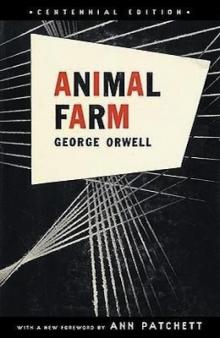 Animal Farm & 1984
Animal Farm & 1984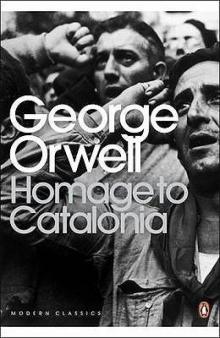 Homage to Catalonia
Homage to Catalonia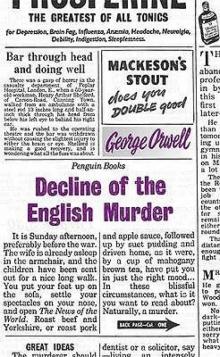 Decline of the English Murder
Decline of the English Murder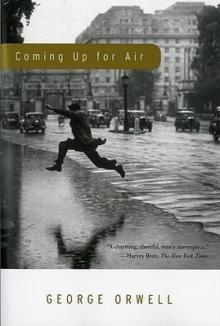 Coming Up for Air
Coming Up for Air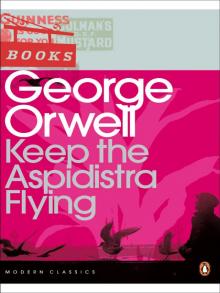 Keep the Aspidistra Flying
Keep the Aspidistra Flying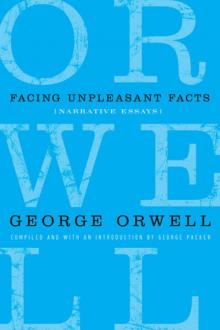 Facing Unpleasant Facts: Narrative Essays
Facing Unpleasant Facts: Narrative Essays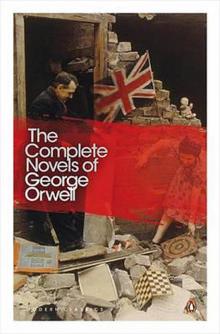 The Complete Novels of George Orwell
The Complete Novels of George Orwell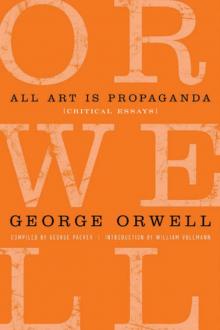 All Art Is Propaganda: Critical Essays
All Art Is Propaganda: Critical Essays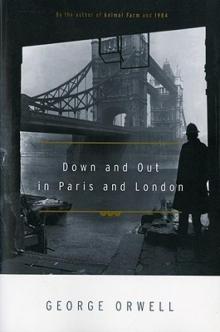 Down and Out in Paris and London
Down and Out in Paris and London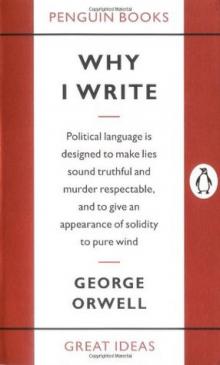 Why I Write
Why I Write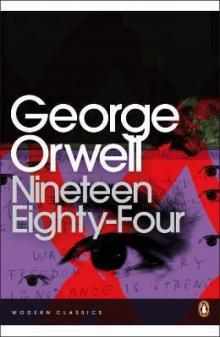 Nineteen Eighty-Four
Nineteen Eighty-Four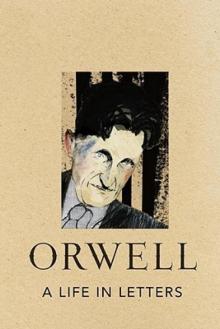 A Life in Letters
A Life in Letters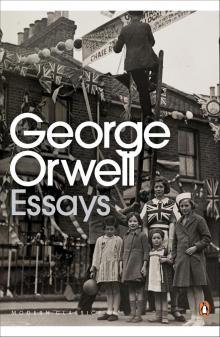 Essays
Essays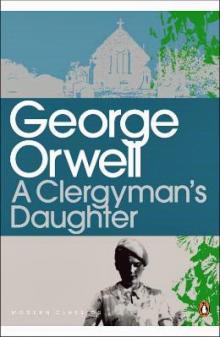 A Clergyman's Daughter
A Clergyman's Daughter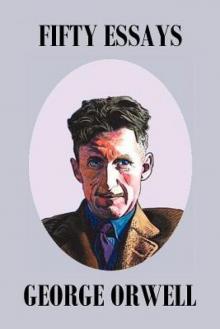 Fifty Orwell Essays
Fifty Orwell Essays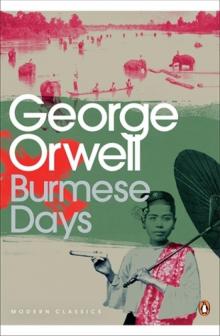 Burmese Days
Burmese Days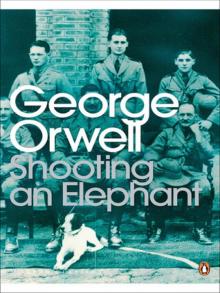 Shooting an Elephant
Shooting an Elephant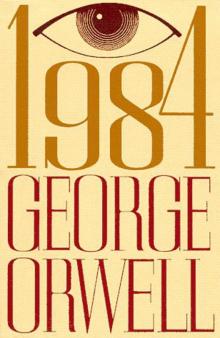 1984 (Penguin)
1984 (Penguin)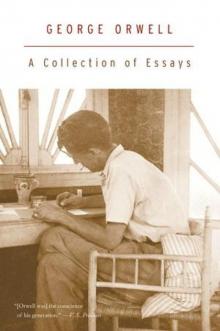 A Collection of Essays
A Collection of Essays 1984
1984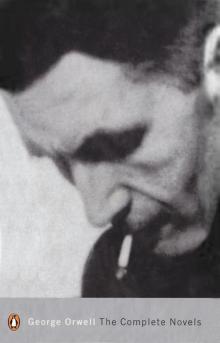 The Complete Novels
The Complete Novels All Art Is Propaganda
All Art Is Propaganda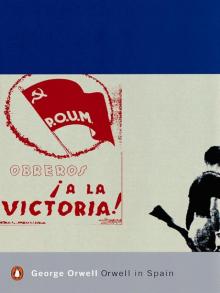 Orwell in Spain
Orwell in Spain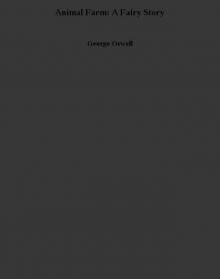 Animal Farm: A Fairy Story
Animal Farm: A Fairy Story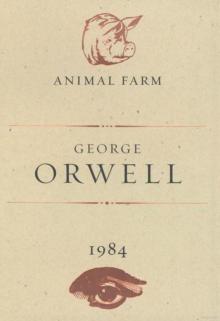 Animal Farm and 1984
Animal Farm and 1984